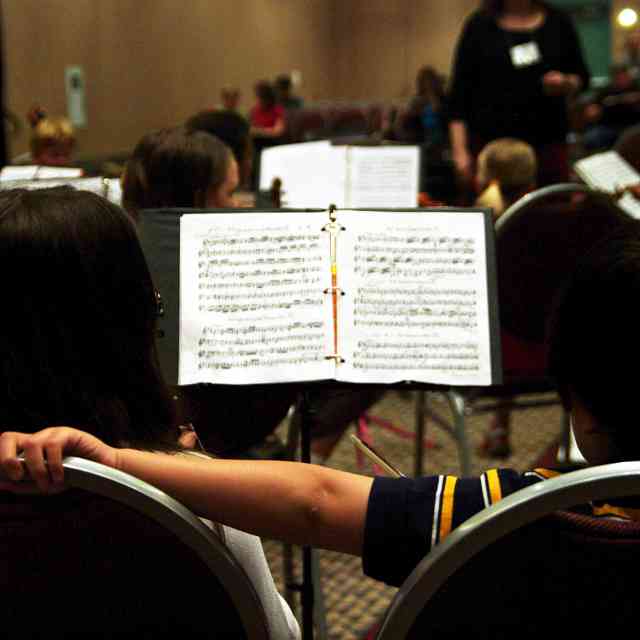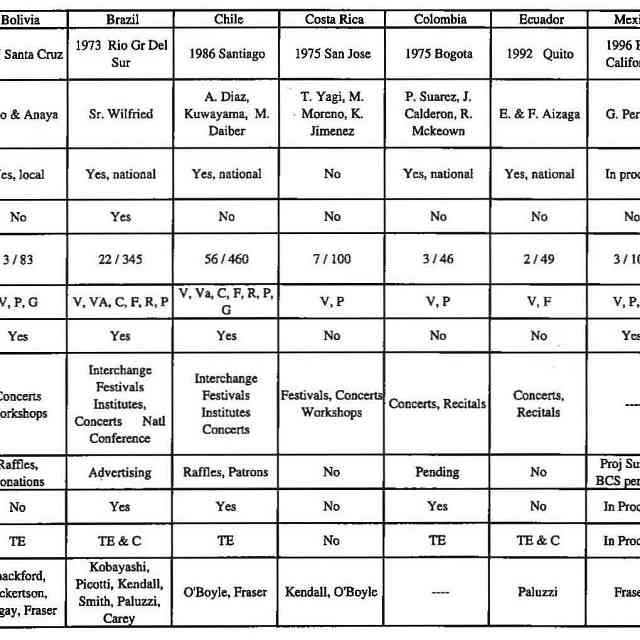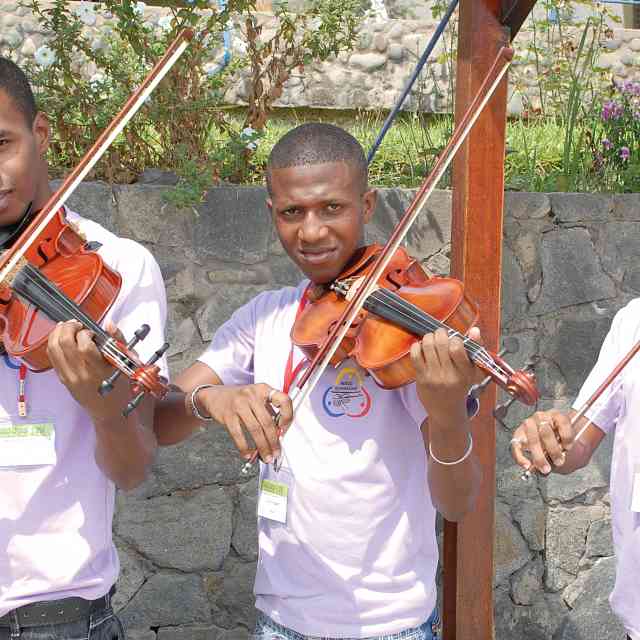Commitment to ongoing teacher training in Latin America
This summer while teaching at some Institutes in the U.S., I made a plea for donations to help make it possible for the Suzuki Association of Peru to offer its annual Suzuki Festival in January. (This will be the 16′h Festival) This is an event which attracts teachers not only from Peru, but also from other Latin American countries. The Peru Festival will probably be the only Institute in Latin America offering teacher training courses in cello and guitar in 2001. I was very moved by the response. At the Idaho Suzuki Institute in Boise, and at Holy Names College in Oakland, California, families and attendees generously made donations, which will go towards providing student and teacher scholarships. Mary Craig Powell also let me know that the teachers in Ohio have once again worked together to donate the proceeds of their Institute to teacher training programs in Latin America. I would like to take this opportunity to sincerely thank all of you who have contributed. You are helping make possible in Latin America what many people take for granted in the United States: providing opportunities for ongoing teacher training.
There are many teachers in Latin America, who, in addition to seeking further training for themselves, commit themselves to providing such opportunities for others. These teachers are completely dedicated and sacrifice countless hours and a great deal of energy in order to make the courses and Festivals happen. Latin America presents special challenges for administrators. Unreliable mail service can make communication difficult. The unpredictability of everyday life can make it hard for people to plan ahead. Therefore in most of the places where I have taught, the organizers of the courses did not know until the first day of the course how many participants there would be. The organizers must have faith! Following are reports from such teachers: Pedro Suarez from Bogota, Colombia, Leila Airut, Magdalena Cano and Sonia Vemaz from Cordoba, Argentina. Finally, I would like to acknowledge some other key people who make ongoing teacher training in Latin America possible- the families who provide the hospitality and so much more! Behind every dedicated leader is a network of love and support. Their commitment is an inspiring example of ”Where love is deep much can be accomplished.”
Thank you, Caroline Fraser & the Latin American Committee
News from Colombia
A report from Pedro Suarez, President, Suzuki Association of Colombia
Translated by Roberta Centurion
I would like to thank teacher trainers Marilyn O’Boyle and Caroline Fraser for their good will in coming to the Suzuki Method Festivals in Colombia. With their great enthusiasm and professionalism they have created a great deal of interest among many teachers. These teachers had known about the method, but were hesitant to begin training until the advent of our festivals, which were organized in collaboration with the Suzuki Association of Colombia.
In Colombia, a country that is having so many difficulties, the possibility of looking for training alternatives in music pedagogy for children and developing the arts does not exist. Fortunately, I found two people who have two great qualities: their expertise as teachers and their ability to speak Spanish. The response of our Colombian teachers and students has been very gratifying, as has the collaboration of such institutions as the National University of Colombia’s and the Inca University’s Departments of Music.
I am hoping in future festivals to include other teachers who would like to come to Colombia to teach other instruments like cello, flute and guitar-instruments that are popular here. It is very important that the Suzuki Method takes root in all of Latin America (as it is developing in Chile, Peru, Argentina, Brazil, Bolivia and Colombia).
As well as promote this event in Colombia, I have had the opportunity to travel to the US with several young teachers to take training courses: first to Miami with Marta Elena Suarez and Fernando Cleves and then this year, to the University of Wisconsin in Stevens Point with Juan Pablo and Andres Murillo, who, because of their professionalism and dedication, learned so much from these experiences.
Report from Marilyn O’Boyle
On June 29, 2000 Caroline Fraser and I landed in Bogota, Colombia, for the Second Colombian Suzuki Festival. The first Festival last July was such a success that we were very excited about the second one. And we were not disappointed. We worked with such wonderful, enthusiastic teachers and great, responsive students! The teachers are all very fine musicians who really understand the impact that Dr. Suzuki’s positive philosophy can have on the families whose children are learning to play using the Mother Tongue Method!
The Festival took place at the National University with plenty of room and good teaching space. I taught 32 teacher workshop participants every morning and taught 36 young students every afternoon. The students received two master classes and two group lessons over a four-day period. The teachers all had Book One memorized and completed the course requirement of playing the entire book for me individually outside of the course schedule (no repeats, please!). Most of the teachers were from Bogota, but there were several teachers from Cali and several from Ibague. On the first day of the course, a group of students from Ibague, directed by their teacher, Amparo Botero, presented all the songs in Book One as a surprise program for us. Other highlights were a wonderful dinner at the home of the director of a school in Bogota, where several of the Suzuki teachers work. The school is really emphasizing music and Suzuki lessons. The director of the school, Constanza Casas, became interested in the Suzuki Method when she and her husband were in graduate school at the University of Nebraska in Lincoln and her twin daughters studied with me! It was amazing to reconnect with the Casas and teach their son, Alejandro, every afternoon! We also had a wonderful final concert with full participation from every student, followed by a photo session in which everyone wanted their photo taken with me.
So it was a wonderful experience and I look forward to continuing with this great group of teachers. Of course, none of it could have happened without the time and effort put forth by the Colombian Suzuki Association, and especially, the president of the Association, Pedro Suarez. He was also a wonderful host and took such good care of us! Thank you, Pedro!
Report from Caroline Fraser
There were nineteen enthusiastic and inquisitive teachers in my piano course, including a young man named Roberto Lecaros who had traveled all the way from Chile to continue his training. I taught in a beautiful little performing theatre with good quality pianos. For demonstration lessons I taught several wonderfully responsive students, including a delightful little three year old, and a self-taught young man who was anxious to develop his technique. We all had a great deal of fun in our group class (age range of students,3-21!) showing the teachers that pianists as well as violinists can enjoy playing together. One of the trainees came up with an instant, creative solution to the problem of there being no footstool. He brought in bricks from outside, and then became the “brick man,” building the appropriate number of layers according to the size of the student! All the piano students participated in the final concert, demonstrating their beautiful tone to a hushed audience. Pedro is already planning the 3′d Suzuki Festival of Colombia, which will take place at the end of June and the first few days of July 2001. For more information please contact Pedro Suarez.
News from Cordoba, Argentina
A report from Leila Airut, Magdalena Cano, Sonia Vemaz
Translated by Roberta Centurion
Suzuki Method teacher training courses have been held in August in Cordoba every year since 1995. The courses were organized by The Suzuki Method (Program) of the Fine Arts School of the National University of Cordoba and endorsed by AMSRA (Suzuki Method Association of the Argentine Republic). This year Unit lA (Suzuki Philosophy) and an enrichment course “Teaching the Suzuki Method to Preschool Children,” were taught by Caroline Fraser.
Now that the intense sessions have successfully concluded, we are happy that there continues to be a great deal of interest in learning more about the Suzuki Method on the part of our community of music educators throughout Argentina.
This interest and the Suzuki teachers’ need to continue their training is reflected in the massive attendance at the extention course “Teaching the Suzuki Method to Preschool Children.” Fifty-two teachers of different instruments (piano, cello, guitar, violin and voice) came from all over the country (La Plata, San Francisco, Belle Ville, Villa Maria, Alta Gracia, Tucumna, Buenos Aires, Santa Fe, Rosario, Cordoba, Santiago del Estero y Jujuy) to gather together in Cordoba. Besides learning from Caroline’s ideas and experiences, they had an excellent opportunity to share ideas, questions and experiences, as well as to get to know one another. This was very enriching for all. Our goal is to continue creating opportunities to train teachers and improve the quality of Suzuki programs in Argentina.
Report from Caroline
Congratulations to piano teachers Sonia and Magdalena (known as Cuqui) and to violin teacher Leila for their dedication and hard work. These teachers certainly are committed to ongoing training and teacher development. They have set the dates for next year’s courses: August 17—23. For further information please contact: Magdalena Canojmcano or Sonia Vernaz.
The idea of offering a Suzuki unit, and in addition, an enrichment course with a special topic which is applicable to all instruments, is excellent. The enrichment course attracts many teachers who have taken some units and are facing the reality of putting theory into practice. (ongoing teacher development). Such a course provides a wonderful opportunity for an interchange of ideas and experiences. I will describe a very positive outcome of such an occasion which took place during the Enrichment course in Cordoba. A very common problem throughout Latin America is how to integrate the Suzuki Method into the Conservatory system. The conservatories normally do not accept students for instrumental instruction until they are about nine years old. (The exact age varies from one country to another.) Even then, the students have to pass an entrance exam in which they are tested for musical aptitude. A group of conservatory teachers spoke about how disillusioned they felt, returning to their old teaching situations after having taken the Suzuki teacher training courses. Present in the group were two teachers who had presented a project to their conservatory in La Plata to start a Suzuki program with children aged three to six. The program is now running very successfully and is expanding. The outcome is that these teachers shared their project with the others who can now present similar projects to their conservatories, citing the Conservatory in La Plata as a precedent.
Also attending this Enrichment course was a guitar teacher, Pablo Bellavia. Pablo had taken my philosophy course and then traveled to Chile last January to study Book One with Frank Longay. He described to me how he is now spreading the word about the Suzuki philosophy amongst his fellow guitarists who teach in various conservatories. He sent me the following report.
Report from Pablo Bellavia
Translated by Caroline Fraser
On Sunday, the 11th of June we held the First Meeting of Children and Young Guitarists in the main hall of the School of Arts of the National University of Cordoba. Children from the Suzuki Method in Cordoba (Argentina) participated along with teachers and students from the provincial music conservatories in the cities of Villa del Rosario and Bell Ville. The gathering was a big success, giving our children an opportunity to share their music and have an unforgettable experience. It is a direct result of ongoing teacher training programs that teachers are working together to change existing structures and ways of thinking to help realize Dr Suzuki’s dream: for the happiness of all children.









